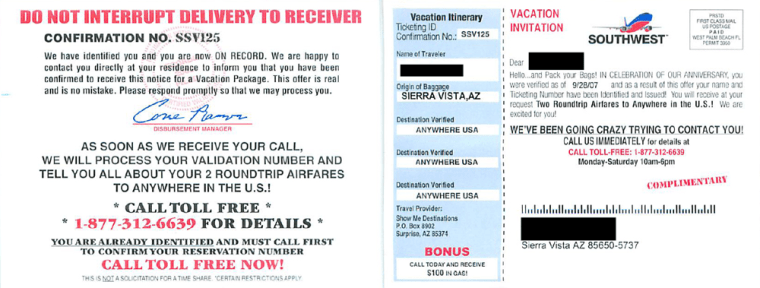Travel is expensive. And quickly getting more so, thanks to rapidly rising fuel prices. Travel clubs promise to cut those costs by giving you huge deals on airfare, cruises, and lodging. The price to join is steep – as much as $8,000 – but members supposedly have access to special savings not available to the general public.
The trouble is many travel clubs can’t deliver the deals. Club members say they can often find similar or better prices on their own. In the last three years, the Better Business Bureau has received thousands of travel club complaints. So far this year, nearly 350 unhappy travel club members have asked the BBB to help them get their money back.
“The come-on is, ‘we’re going to let you in on a secret,’ ” explains Tom Collier, President and CEO of the BBB of Southern Arizona. But he says there are no secrets and few great deals. “The bargains and discounts you get are very limited and the quality is not generally the best. You may get that Hawaiian condo on Waikiki, but it may be 8 blocks off the beach.”
Tom Cross of Tucson, Ariz., shelled out $3,475 for his club membership. Cross was told that by joining he would become an “outside travel agent” able to get super-low prices on everything from cruises to condos.
Cross tried to make several condo reservations, but the travel club prices were always higher than if he booked it himself. The condo in Jackson Hole, Wyoming was $100 more than booking directly with the resort. The travel club price for the condo in Orlando was $300 more than he could get on his own.
“I paid them $3,475 and essentially it’s gone down the drain,” he told me.
How they get you
It usually starts with a phone call or mailing that offers airline tickets, gas cards, cash, or some type of vacation just for attending a sales presentation.
The postcards I’ve seen are deliberately misleading. “Pack your bags!” they say. There are two roundtrip airfares to anywhere in the U.S waiting for you. “This offer is real and is no mistake.”
This “vacation invitation” has the logo of an airline prominently displayed on the front, so it’s easy to assume the postcard is from the airline. It’s not. The airline has nothing to do with this promotion.
To get the free trip you have to sit through what BBB spokesman Steve Cox calls “slick presentations” done by high-pressure salesmen. The free trip vouchers they give you are very difficult to use because of all the restrictions.
The BBB in Tucson read the fine print on one company’s incentive travel certificates. It said the trip could not be taken within 10 days before or after a holiday. Based on that restriction, the bureau plotted out the possible travel dates and found there were only 32. And then you’re often required to pay a “good faith deposit” of $100 to $250 to book the free trip.
How they do it in Branson
In Branson, Mo., they use another technique. Visitors are offered free show tickets and cash to come to the sales presentation. The pitch can take place as you leave a restaurant or when you stop to ask for tourist information.
Orville and Mavis Langlie from Ellendale, Minn., took that bait. They sat through what Orville describes as a fast-paced, high-pressure presentation. “She talked so fast and she just went from one thing to the other. She kept rattling off all these different trips that were so cheap, and really made it sound like it was the best thing this side of heaven.”
Convinced it was legit, the Langlies bought a lifetime membership for $3,400. “We were dumb enough to fall for it,” Orville says.
When they got back home, they tried to use the club, but the prices were less than spectacular. “We could get cheaper trips on the Web than we could from them,” Orville told me. For example, they tried to book at hotel in Boston for their granddaughter’s honeymoon. The closest place the travel club could offer was 100 miles away.
The right to cancel
If you join a travel club and the presentation is done at a hotel or some other location that is not the club’s normal place of business, you have three days to cancel. Federal law guarantees this cooling off period. If the pitch takes place in the club’s office, you’re a member the minute you sign the contract.
The bottom line
Travel clubs are what the Better Business Bureau calls a “suspect industry” because there are so many dissatisfied customers and misleading sales tactics are so often used.
Even so, the Bureau says there are some good travel clubs out there. The only way to find them is to do your homework before joining – something you cannot do at a high-pressure sales presentation.
And consider this: Collier at the BBB in Tucson told me in most cases, you’d be better off not joining a high-priced club – and instead paying the fee charged by a good travel agent. Joining a travel club “is just not cost effective,” he says. “You’ll never make back the cost of joining.”
More information
BBB Warns Vacationers that Travel Club Membership Doesn’t Always Pay
